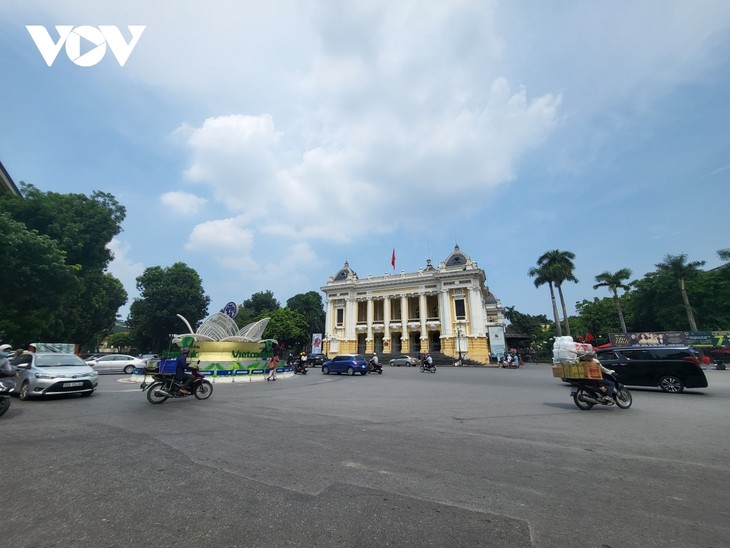 Hanoi attracts a lot of domestic and foreign tourists in autumn, a good time to visit the capital city. Photo of the Opera House in Hanoi (VOV) Hanoi attracts a lot of domestic and foreign tourists in autumn, a good time to visit the capital city. Photo of the Opera House in Hanoi (VOV) |
B: We hope VOV’s news stories and daily features about Vietnamese society, culture, and business will give you the information you need. We also hope to see you in Hanoi soon.
A: Psychology Prof. Satishchandra Kumar of the University of Mumbai said he is currently in Ho Chi Minh City working on the 3rd anthology of poems for the International Day of Peace on September 21 and would be happy to make contact with some Vietnamese poets.
B: We suggest you contact the Vietnam Writers’ Association at 9 Nguyen Dinh Chieu street, Hanoi, or 43 Dong Khoi street, District 1, Ho Chi Minh City. The Association’s website at vanvn.vn, introduces the most famous Vietnamese poets of all time and their poems as well as amateur poets working in various sectors.
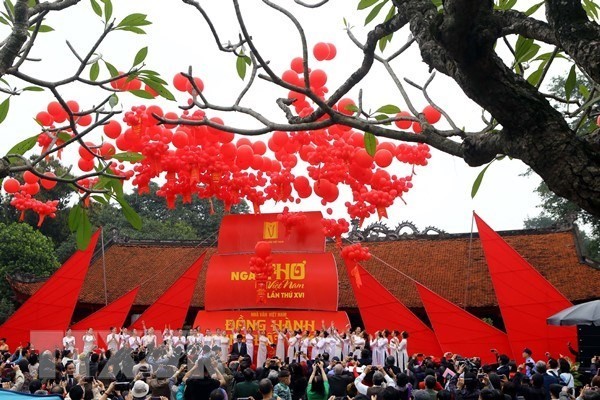 National Poetry Day is observed on the 15th day of the 1st lunar month every year. (File photo:) National Poetry Day is observed on the 15th day of the 1st lunar month every year. (File photo:) |
A: The Vietnam Writers’ Association was established in 1957. Starting with 278 members, the Association now has more than 1,000 members. During the war many Vietnamese writers joined the army and died fighting for national independence and freedom. Many contemporary Vietnamese writers have promoted attracted foreign readers and won prestigious prizes abroad.
B: Poetry is a vital channel for the voice of the Vietnamese people, recording their struggle, survival, triumph, love, and life. In recent years, many literary works by Vietnamese writers have been translated into other languages, including an anthology of poems by Mai Van Phan and Thanh Thao, poems by young Vietnamese poets, and novels by Hoang Quoc Khai and Trung Trung Dinh.
A: Poet Mai Van Phan, whose poems have been translated into 24 languages, said foreign readers welcome special literary works featuring national identity, portraits, and human stories from other countries. They love to see new styles and artistic values.
B: He has published 30 collections of poems and essays, including English and French translations of his poem collections. He has won numerous awards in Vietnam and other countries, including Sweden’s Cikada Prize.
B: Phan’s "Firmament Without Roof Cover" was one of Amazon's 100 best-selling poetry books in December 2012. In June 2014, he had 3 poetry books in the top 10 best-selling Asian poetry books on Amazon: the Vietnamese-English poetry collections “Grass Cutting in a Temple Garden” and “Seeds of Night and Day, and the Vietnamese-French poetry collection “A Ciel Ouvert.”
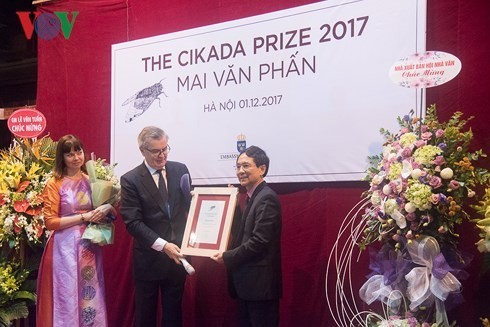 Poet Mai Van Phan receives Sweden’s Cikada Prize in 2017. (File photo) Poet Mai Van Phan receives Sweden’s Cikada Prize in 2017. (File photo) |
A: We hope Prof. Satishchandra Kumar of India can meet some of these Vietnamese poets to complete his anthology of poems to celebrate International Day of Peace on September 21.
B: Hari Santosa of Indonesia asked us about the sandals made from rubber tires that were worn by Vietnamese soldiers during the war.
A: Vietnamese began making rubber sandals in the 1940s during the first Indochina War using tyres from French army trucks. Cheap and practical for wet weather, they later became a symbol of Vietnamese soldiers. Even President Ho Chi Minh wore rubber sandals during the war and his sandals are now on display at the Ho Chi Minh Museum. Those rubber sandals are often called Uncle Ho’s sandals.
B: Now many people make rubber sandals from car tires, but Vua Dep Lop – King of Rubber Sandals is a well-known brand internationally. Visitors to the Ho Chi Minh Museum on Ngoc Ha Street in Hanoi can buy rubber sandals made from old car tires as a souvenir of Vietnam.
A: The average price is about 10 dollars a pair. Foreign customers have taken the sandals back to many countries, including the UK, France, the US, Japan, and China.
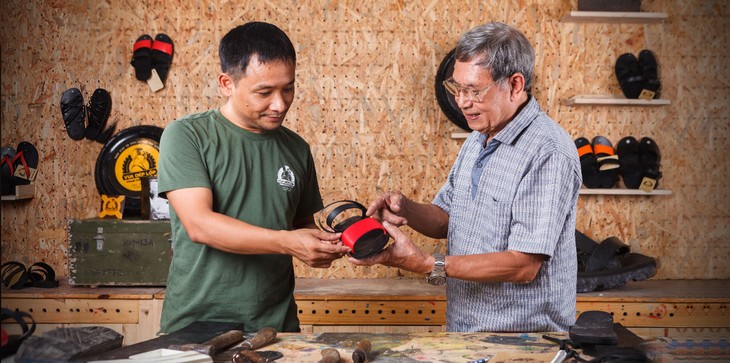 Pham Quang Xuan and his son-in-law Nguyen Tien Cuong at their King of Rubber Sandals workshop. (photo: vuadeplop) Pham Quang Xuan and his son-in-law Nguyen Tien Cuong at their King of Rubber Sandals workshop. (photo: vuadeplop) |
B: Nguyen Tien Cuong, owner of the King of Rubber Sandals company, took over the business from his father-in-law in 2011 and has sold more than half a million pairs of rubber sandals since then.
B: His father-in-law, artisan Pham Quang Xuan, was the last maker of rubber sandals in Hanoi and was the person who made the sandals for President Ho.
A: To introduce his products to more customers, Cuong opened stalls at tourist sites like the Ho Chi Minh Museum, the Vietnam Military History Museum, and the Ho Chi Minh Mausoleum. Each stall describes the history of the rubber sandals, so customers will understand what they are buying.
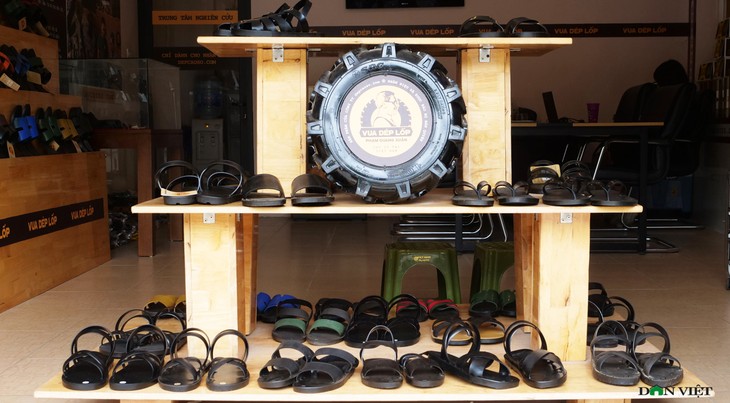 Rubber sandals of Vua Dep Lop (photo: Dan Viet) Rubber sandals of Vua Dep Lop (photo: Dan Viet) |
B: Besides the traditional model Vua Dep Lop has used newer materials, designs, and colours to create fashionable footwear for young and old customers. Leaflets in several languages explain the sandals to foreign customers. Vua Dep Lop products are promoted on social networks like Facebook and YouTube.
A: Siddhartha Bhattacharjee of India asked us about human organ donations in Vietnam.
B: In recent years the number of people registered to donate organs at hteir death has increased to almost 50,000. When the Vietnam National Coordinating Center for Human Organ Transplantation was established in 2014, it received just 200 registrations.
A: The number surpassed 20,000 in 2017 and 46,000 in 2021. The Center’s Director Đồng Văn Hệ says many touching stories about organ donations following brainstem death have changed people’s views about dying.
B: He said 95% of organ transplants in Vietnam involve a living donor. Just 5% involve organs from a deceased person. Vietnam has 300 hospitals that treat traumatic brain injuries. It each of those facilities could persuade just one patient to donate an organ, there would be 300 more donations per year.
A: Since the first organ transplant in 1992, Vietnam has carried out 6,500 more such operations. There are 23 hospitals qualified for organ transplantation in Vietnam. The Vietnam Society of Organ Transplantation says Vietnam successfully carried out 6,550 organ transplants, including 6,094 kidney, 384 liver, 59 heart and nine lung transplants from 1992 to March, 2022.
A: That concludes today’s program. We welcome your feedback at: English Service, VOVWorld, the Voice of Vietnam, 45 Ba Trieu street, Hanoi, Vietnam. Or you can email us at: englishsection@vov.vn. You’re invited to visit us online at vovworld.vn, where you can hear both live and recorded programs.
B: Check out our VOV Media App, available on both the IOS and Android platforms, to hear our live broadcasts. We look forward to your feedback on the mobile version of vovworld.vn. Once again, thank you all for listening. Goodbye.